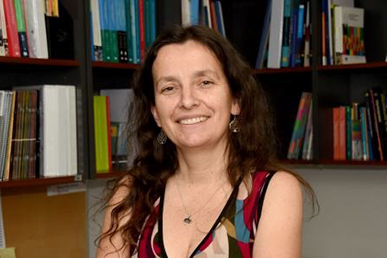Introducing Dr Alejandra Arratia Martinez
Head of the Curriculum and Assessment Office, Ministry of Education, Chile
Doctor of Education

Taking on a PhD is daunting but imagine traveling half way across the world with your partner and four children to do just that – meet Dr Alejandra Arratia Martinez, an educational psychologist who has been working for the last 28 years in the Chilean education sector.
She along with her husband, 12-year-old twins, 3 and 4-year-old daughters called Melbourne home for almost five years while she completed her Doctorate in Education.
A recipient of a scholarship established by Chile’s first female president, Michelle Bachelet, in commemoration of 200 years of independence, provided Alejandra the opportunity to study at Melbourne Graduate School of Education (MGSE).
The decision to relocate to Melbourne was a response to the work she was doing at the Ministry of Education. “Working closely with teachers in the use of assessment data to inform teaching allowed me to see how a developmental approach was powerful but also challenging for teachers, and how it questioned many of the previous ideas about learning, curriculum and teaching”, says Alejandra. This spurred the idea for further study.
Attracted by the work of the Assessment Research Centre (ARC) in relation to developmental assessment and teacher professional learning made MGSE an obvious choice.
According to Alejandra, there were many valuable aspects for doing the Doctor of Education at MGSE but the one that stood out the most was being part of a learning community that MGSE offered and all that this included: opportunities to meet and discuss course matter with high-level professionals and researchers, access to learning spaces, resources, continual support and the open approach to research which collectively made it an overall fantastic experience.
Her research was conducted as part of the Assessment and Learning Partnership Project (ALP) and looked at the relationship between developmental assessment and teachers’ metacognition about differentiated teaching and professional learning.
Thus, the understanding of learning and teaching in a developmental framework has shaped the way she now thinks about curriculum and assessment, and she feels that it has had a huge impact in the way she is leading the process of building curriculum in Chile.
Alejandra is the Head of the Curriculum and Assessment Office in the Ministry of Education of Chile, where she oversees all the curriculum and assessment definitions for the educational system. In addition, she is responsible for the selection and distribution of more than 18 million school text books for students and resources for the school libraries that are provided to all public schools in Chile.
Despite receiving a scholarship, Alejandra had to work throughout her studies to help support her family of six. She worked as a facilitator as part of the research team for the ALP Project and was responsible for supporting the work of Professional Learning Teams of schools participating in the program.
Juggling work, study and family life was challenging, but with the help of some creative mantras such as ‘working hard, with no pause’ and ‘you can eat a dinosaur, you just have to go one bite at a time’ was the best way for Alejandra to deal with the challenges set before her. The family too embraced the philosophy that life begins at the end of your comfort zone. Alejandra says, ‘Even when we went through difficult times we knew that we could get through it if we put our minds to it.’
Completing her PhD at MGSE was a wonderful adventure and experience not only for Alejandra but for her whole family. When it was time to leave, the kids were 17, 9 and almost 8. What they took home to Chile was more than a PhD, it was the understanding that things can be different, that society can change if you put your mind into it and that ‘going one bite at a time, they can eat a dinosaur.’